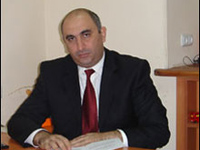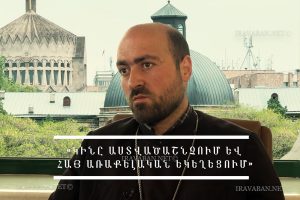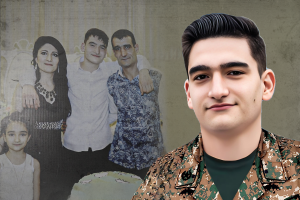THE SECOND GENERATION REFORMS SHOULD START FROM THE SYSTEM OF JUSTICE
TODAY THE PUBLIC LACK CORRESPONDING RESERVS OF CONFIDENCE TOWARDS THE DOMESTIC COURTS
– Today we often speak about the second generation reforms to be implemented in the system of justice. What do these reforms anticipate?
– Currently we often speak about the necessity to realize the reforms of the second generation, which our citizens need and expect. The second generation reforms should anticipate express decrees of corruption and protective risks, as well as will ensure healthy competitive environment in the economic sphere. These are the main and the most necessary steps that most of us anticipate. In the context of the second generation reforms more importance is attached to the reforms in the justice system, where the most crucial issue is ensuring independence of courts. This independence will provide opportunity to realize efficient and complete justice, which in its turn will insure protection of the citizens’ rights, including restoration of infringed rights. In fact today the Republic of Armenia justice system needs interior reforms. These reforms will bring hope, confidence and trust to every citizen of our country. And only the lawyers of the new generation with high professional qualification, morality and corresponding will, are able to instill new breath and spirit into such reforms that are aimed at the improvement of the justice system of our country, and to realize irreversible reforms. In this respect it will be correct to say once and again that currently realization of the second generation reforms in Armenia is an imperative need and the realization of these reforms should start from the System of Justice.
– What reforms does the Advocacy Institute needs in this context?
– At present this system also has a number of problems, which need urgent solution. The legislation field, which regulates the Advocacy sphere, needs to be reformed first of all. The corresponding amendment in the Republic of Armenia Law on Simplified Tax should be the first step here. This will provide opportunity for the advocates, as well as law companies that carry out advocates’ activities to tax their activities through simplified tax at the rate of the twenty percents of their annual revenue, and at the same time without limiting the total cost of the advocacy services provided. This approach is currently applied with respect to the notary services, and it is obscure why it shouldn’t be applied with respect to the advocacy services. Otherwise the biased approached provided by the RA Law on Simplified Tax occurs ludicrous.
– Thus it turns out that there are loopholes in the legislative filed here, aren’t there?
– A lot should be done from the aspect of improvement of the laws, although the principal solutions in the legislative field, which regulate the advocacy sphere have already been achieved from the basic point of view. In particular the RA Law on Advocate’s Activities was adopted in 1998, which in 2004 was substituted by the RA Law on Advocacy.
– The laws have been adopted, yet do they serve to their exact goal?
– I think a considerable disjunction between the lawmaking activities and application of the law in practice among us. The whole logic of the second generation reforms is that when the legal field, which regulates the sphere of justice, was established in the first stage, now we should show the corresponding will and implicitly apply the adopted laws. In this respect we should also state that rather considerable corruption risks currently exist in the activities of the bodies, which exercise laws in the sphere of justice. These risks cause the necessity to worry, consider and to try to decrease them during the implementation of the second generation reforms.
– Which is the mane role of the RA Chamber of Advocates in this respect?
– I attach importance to the role of the RA Chamber of Advocates, and think that the latter should solve the following problems. Primarily the Chamber of Advocates should establish corresponding conditions for realization of professional advocate’s activities, and at the same time refer to the issues reformation of the legislative field, which regulates the advocacy sphere. Second, the Chamber of Advocates should protect the rights and legal interests of its members in the relations with the governmental and non-governmental bodies, including the courts. Third should attend to the training and retraining issues of the advocates and redirect this function to the organization that have particular professional specialty. Another very important condition here is that the chamber of advocates should realize its day-to-day monitoring function in order to prevent its members from violating the Advocate’s Code of Ethics. The Disciplinary Commission of the Chamber should reveal the infringements of the advocates and discharge the “pseudo advocates” and thus promote the development of an Advocates’ community that have qualified advocates with high morality values.
– What is you opinion on the institute of the accredited advocates and the sanctions, which the courts apply towards the advocates?
– Recently the Advocacy got rid of the absurd and clumsy institute of the institute of advocates that are registered at the Cassation Court. Still it was again imposed upon the advocates under the curtain the Institute of accredited advocates at the Cassation Court. From the viewpoint of the protection of human rights this was a blow over the ordinary citizen of our country, because since then, this made almost impossible and inaccessible for him to file a cassation appeal. Introduction of the Institute of Accredited Advocates will considerably reduce the efficiency of realization of our justice, and at the same time increase the corruption risks. Another obstacle for the development of the current stage of the Advocacy Institute was introduction of the institute of court sanctions. From now and on through this sanctions that are provided by the law, the judges can restrain the advocates who struggle till the end for realization of the rights of their clients as well as their own rights, and thus promote the development of a majority of a “type of advocates who are predictable and governable.” The only way out of this situation is establishment and having strong institute of advocates, which has its own professional managerial staff that is able to demonstrate a corresponding courage and will to ensure the ultimate development of the advocacy institute.
– Why do you think the public currently do not trust the RA Courts?
– Yes I agree, unfortunately currently the public do not trust the domestic courts and lack the corresponding reserve of confidence. Of course this has been formed during the soviet years and continues on inertia until now. And we may definitely say that such an approach could not have been formed among our public without any objective grounds. Any citizen can afford living in his own country under hard and poor conditions when they are confident that those are temporary hardships, and having in their minds the high values and ideals, for which they suffer. While living under hard conditions the citizen should be confident that he could find justice for himself at any moment. The same citizen cannot live under dignified living conditions when he cannot master and protect his own rights, support to the restoration of the violated rights of his family members, his family, relatives and friends. Under these circumstances the citizen will feel himself abandoned and useless even in his homeland, and even the justice, as well as reparation of material and mental losses from the European Court on Human Rights cannot ever substitute the feeling of justice, which the citizen may find in his native land. In this sense the courts, as well as the advocates’ companies and law enforcement bodies should show a corresponding will and undertake efficient measures to live up to the citizen’s expectations who seek justice in his motherland. If we shall analyze the Armenian word “ardaradatutyun” (justice) we shall see that it consist of two words “ardar” (just), which is from the mental sphere and “dat – datel” (to judge) from the legal sphere, and these spheres in the sense of this word are mutually interrelated. And we should note that the system of justice may not be complete and function duly in case of the absence of one of these components. Any judge should have both of these values. We should also remember in the Armenian legal acts of the middle ages our great ancestors have allocated a number of principles of justice and formulated corresponding professional and moral criteria for judges. These criteria are actual in our days as well.
In this regard the second generation reforms have no alternative. I would like to mention once and again that on reasonable grounds these reforms should be realized by the lawyers of the new generation having high professional qualification, morality and corresponding will as well as resolution. There is another evident circumstance as well, it is clear that realization of the second generation reforms will face a distinct resistance of the current judiciary and legal system. Resistance, which is easy to overcome by means of corresponding political will and consistent struggle.















